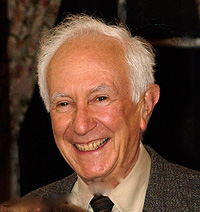The 2010 Rosalind Kornfeld Award goes to Jeremiah SilbertThe Society for Glycobiology is pleased to announce that the recipient of the 2010 Rosalind Kornfeld Award is jointly awarded to Harry Schachter and Jeremiah Silbert. The Rosalind Kornfeld Award for Lifetime Achievement in Glycobiology was established in 2008 to honor the distinguished scientific career and service to the Society by Dr Rosalind Kornfeld. The award is given by the Society to scientists who have, over their professional lifetimes, made significant contributions with important impact on the field.
The Silbert lab discovered the basic steps and intracellular localization to microsomal membranes for the formation of sulfated glycosaminoglycans and laid the groundwork for subsequent advances in heparin biosynthesis primarily in the laboratories of U. Lindahl, R. Rosenberg and their colleagues. The work of Silbert and his colleagues on chondroitin sulfate biosynthesis has dominated the investigation of the glycosaminoglycan portion of this important proteoglycan. This included the Golgi localization of membrane-bound core protein with membrane-bound enzymes for formation of the GlcA-Gal-Gal-Xyl linkage region, production of GalNAc-GlcUA polymer, sulfation of the growing polymer, and demonstration that epimerization of glucuronic acid to iduronic acid (established by others) to form dermatan was directly influenced by sulfation. Silbert and his colleagues were also the first to demonstrate the presence of heparan sulfate and chondroitin on normal cell surfaces (following the initial description by P. Kramer of heparan sulfate on malignant cell lines) and to describe interactions with lipoprotein lipase, fibronectin and laminin. His early studies on hyaluronidase demonstrated its decrease as skin glycosaminoglycans changed from hyaluronan to chondroitin/dermatan sulfate during tadpole to frog metamorphosis, which has been subsequently shown to be a major change during embryonic connective tissue development in many organs. Collaborative studies have also contributed to descriptions of glycosaminoglycan presence and changes in many cells and tissues such as skin, lung, cornea, alveoli, basophils, and mast cells. Recently, Silbert demonstrated that glucosamine blood levels after its ingestion were minuscule, much too low to have any direct effects on synthesis or protection of joint cartilage chondroitin sulfate. Thus, the use of this billion dollar a year over-the-counter neutraceutical advertised for treatment of cartilage in osteoarthritis is of highly questionable value. Dr. Silbert was also instrumental in the early development of the Society for Glycobiology as a member of the Executive Committee, Secretary for seven years, and then President-elect and President. During this time he proposed the Meyer award, and initiated the organization of committees including those of Awards, Program, and Nominations, providing ideas and leadership during the transition of the Society into its current form. In recognition of his 50-year research career and significant scientific contributions to proteoglycan biosynthesis, structure, and function, and his leadership in the Society and field of glycobiology, the Society for Glycobiology has awarded Dr. Silbert the 2010 Rosalind Kornfeld Award for Lifetime Achievement in Glycobiology. |

 Jeremiah (Jerry) Silbert (Professor of Medicine, Harvard Medical School and Brigham and Women's Hospital, and Senior Medical Investigator Emeritus, Veterans Affairs Medical Center, Bedford MA) has pioneered studies on glycosaminoglycan biosynthesis, structure, function, degradation, localization, and description in cells and tissues. His earliest work on heparin biosynthesis employed the incubation of radioactively labeled sugar nucleotides with microsomal fractions of mouse tumor mast cells to define the basic formation of a heparin GlcNAc-GlcUA polymer precursor that he then showed was followed by deacetylation/N-sulfation and O-sulfation when he added PAPS to the incubation. Subsequent studies by Silbert and collaborators demonstrated the attachment of the polymer to a protein core and not a free glycosaminoglycan as was generally thought. Accompanying this was a similar demonstration of chondroitin sulfate biosynthesis by use of microsomal fractions from chick embryo epiphyses.
Jeremiah (Jerry) Silbert (Professor of Medicine, Harvard Medical School and Brigham and Women's Hospital, and Senior Medical Investigator Emeritus, Veterans Affairs Medical Center, Bedford MA) has pioneered studies on glycosaminoglycan biosynthesis, structure, function, degradation, localization, and description in cells and tissues. His earliest work on heparin biosynthesis employed the incubation of radioactively labeled sugar nucleotides with microsomal fractions of mouse tumor mast cells to define the basic formation of a heparin GlcNAc-GlcUA polymer precursor that he then showed was followed by deacetylation/N-sulfation and O-sulfation when he added PAPS to the incubation. Subsequent studies by Silbert and collaborators demonstrated the attachment of the polymer to a protein core and not a free glycosaminoglycan as was generally thought. Accompanying this was a similar demonstration of chondroitin sulfate biosynthesis by use of microsomal fractions from chick embryo epiphyses.